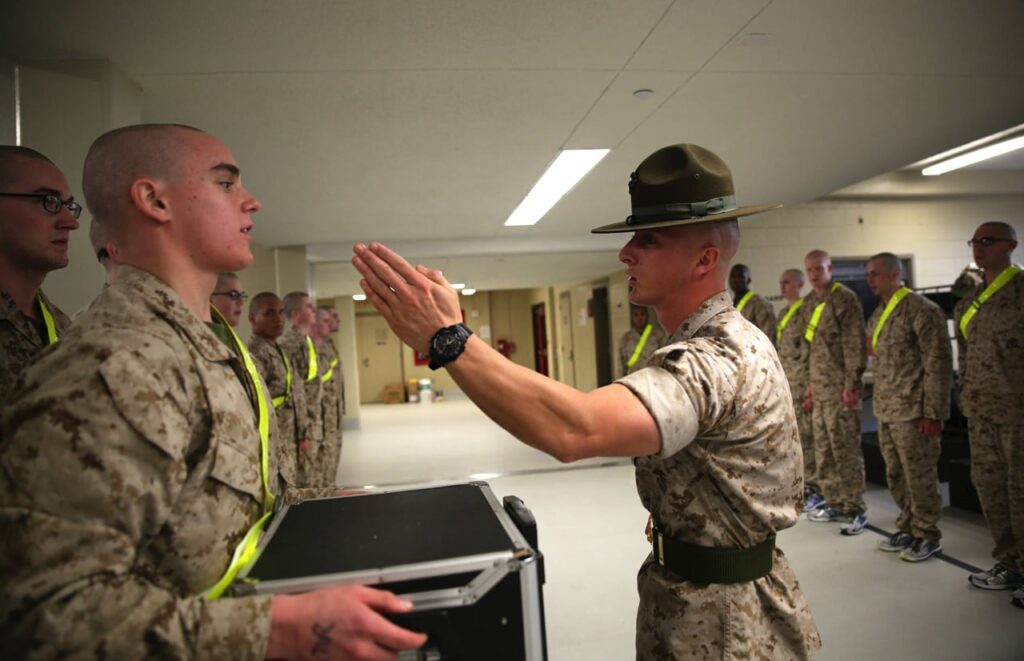
- The App
- Sandboxx News
- Resources
Learn
- Company
About
Become a Partner
Support
- The App
- Sandboxx News
- Resources
Learn
- Company
About
Become a Partner
Support
Feeling overwhelmed by your civilian job search? Uncertain of how to leverage your military skills to get the job you want? Sandboxx has teamed up with...

Uncertain of how to leverage your military skills to get the job you want?

Sandboxx has teamed up with Betts Recruiting and other partners to help you smartly navigate your career transitions and avoid common pitfalls. Get helpful content, tailored for where you are in your military journey, each week in the Sandboxx app!
Reentering the civilian world is tricky enough, but tack on undergoing possibly your first job search, and it becomes an even crazier and more difficult process. Fear not—it’s not as difficult as you may perceive. The following 7 steps can help you as you start building your new résumé – because it’s not going to write itself.

Don’t think of your military experience as something that sets you apart from other applicants in a bad way—it is much more valuable than you realize. All you have to do is word your experiences in a way that helps your future employer see how what you learned during your time in service can apply to a civilian work environment.
Top tip: abandon all “military speak”
During your time in the military you learned to speak a different language—a language that most civilians cannot relate to. Being able to speak these two languages is a valuable skill that will serve you well once you’ve landed a job. But for now just focus on translating this language into something potential employers cannot only understand but also use to view you in a positive light.

# 1: Your military background is likely filled with acronyms like XO, PCS, MOS and TDY.
But to a prospective boss, these designations are most likely complete gibberish and the last thing you want is someone having to Google every other word on your CV.
“The last thing you want is someone having to Google every other word on your CV.”
This rule goes for military awards too as they can be similarly unclear. Resist the temptation to stock your résumé with:
Instead, mention that fact that you were awarded for excellent job performance. If an award you received showcases outstanding skills that also apply to the job you are seeking, feel free to elaborate. This can set you apart from other applicants and further your case.
Overall, people hate to be confused, and seeing military abbreviations listed on your résumé might cause whoever is reviewing it to assume that you are:
…even if none of that is true. Cue your résumé becoming a part of office wastebasket basketball.

# 2: Avoid exaggeration and do not lie. This might seem obvious, however, it’s easy to get carried away when writing a résumé. You might tempted beef up your CV by filling in the blank spaces with words that make you sound more professional. Stop right there.
Job recruiters and résumé readers are excellent at spotting fakes. Keep in mind that they receive hundreds of résumés for a single position and want to narrow down the pile as quickly as they can. This is why you should focus on sticking to the truth and highlighting the skills you possess that make you an attractive candidate.

First, think about the skills you gained during your military service that would be useful in the job field you are interested in:
The list goes on and on, and the more you consider your military experience the more material you’ll have to work with.
Some potential high-level skills might include such generic examples as these:
Once you have an outline of the general skills you acquired, it’s time to get more specific, like this:
It is also important to consider specific experiences you had that you can quantify on your résumé. This will help prospective employers get a better idea of your accomplishments and how they can apply in a civilian workplace. For example:
These are just a few examples, but I guarantee that once you’ve gone through this exercise you will find ways to expand on each category with specific examples.
Third, compare the skillset list you created with the civilian job function you want to pursue. You need to convince the first person who sees your résumé that you are not only highly skilled, but that your experience would be a strong asset to their company brand.
“You want to convince the first person who sees your résumé that you are not only highly skilled, but that you will be a strong asset to their company.”
Unfortunately, you are far from the only person conducting a job search, and it is also likely that you will be competing against other veterans for certain jobs. This means you need to make yourself stand out and take the extra step to tailor your skills and experiences to match the job requirements for each position.
After you have done this, a good test is to have a civilian friend or family member read over your list of skills and experiences and make sure that they understand what you’re saying.
“Have a civilian friend or family member read over your list of skills and experiences and make sure that they understand what you’re saying.”
Don’t be afraid to ask for help! You’re going through a tough process of re-integration into the workforce and chances are there are lots of people all around you that are more than willing to offer advice on both content and formatting.
Finally, to get a few different takes on the process, I’ve attached some links to articles that also offer guidance on building a post-military résumé as well as more specific translations of what ranks equal potential jobs in the civilian workforce.

Stay tuned to this series if you want to:




